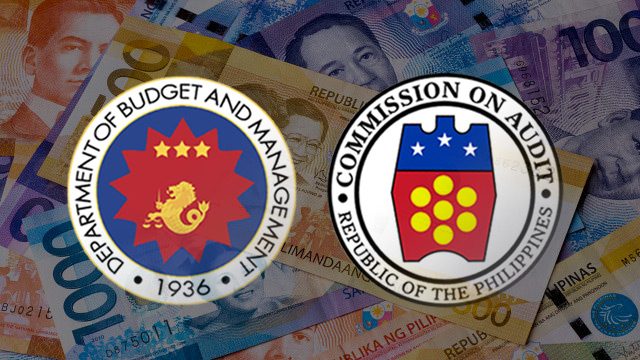SUMMARY
This is AI generated summarization, which may have errors. For context, always refer to the full article.

MANILA, Philippines – The Department of Budget and Management (DBM) clarified on Monday, June 20, that bottom-up budgeting (BUB) funds were not released to “unqualified” local government units as questioned by the Commission on Audit (COA).
In a report, COA asked the budget department to explain why 133 “unqualified” LGUs were given P1.278 billion ($27.59 million) in projects under the BUB program in 2015.
“We provided our state auditors the objective evidence to clarify that no funds were released to cities or municipalities that were non-compliant with the prescribed governance conditions under the General Provisions of the 2015 General Appropriations Act and pursuant to the Joint Memorandum Circular on the guidelines for the implementation of the BuB,” Maxine Tanya Hamada, DBM assistant secretary for monitoring and evaluation, said in a statement.
According to Joint Memorandum Circular No. 6 issued on February 27, 2015, an LGU must comply to good governance and financial housekeeping conditions to be eligible for the program.
Hamada said that oversight agencies have made it clear to implementing agencies and local governments that failure to comply with the set governance conditions means no BUB funding. It also means that LGUs will have to implement the projects themselves.
COA revealed that P1.278 billion ($27.59 million) were downloaded to various localities to implement 800 BUB projects in 2015 despite the beneficiaries’ failure to comply to set governance standards, a report by The Standard on Saturday, June 18, noted.
According to the report, 133 LGUs were not part of the 2014 Good Financial Housekeeping Passers nor were passers of the After Assessement Compliance, as of February 29, 2016.
“(It) defeated the purpose of standards set on local governance,” the COA report further read.
So where did the money go?
If BUB funds were not released to “unqualified” local governments, where did it go?
According to the statement, the DBM has issued a response to COA on May 6 indicating that some P66,825,515 ($1.44 million) has not been released of the P1,278,156,698 ($27.59 million) total funds.
Meanwhile, some P1,098,855,098 ($23.71 million) was released to various national government agencies for the implementation of 750 projects in identified local government units, according to the local poverty reduction action plans (LPRAPs) submitted by beneficiary communities.
Some P106,476,085 ($2.30 million) were downloaded to qualified provincial governments to implement 25 projects in cities and municipalities that did not comply with the set governance requirements.
The remaining P6 million ($129,512) went to the municipalities of San Agustin in Romblon and Candijay in Bohol, receiving P5 million ($107,923) and P1 million ($21,585) in BUB funds respectively, after complying with the Good Financial Housekeeping requirement.
According to Hamada, downloading of funds is consistent with Joint Memorandum Circular No. 6, the policy guideline in BUB implementation for 2015.
She further clarified that non-compliant local governments were given until March 2015 to comply with the set governance conditions.
“If a city or a municipality fails to comply, national government agencies may release the funds to its provincial government provided that (it) is compliant with the Good Financial Housekeeping requirement and the concerned Local Poverty Reduction Action Team agrees to have the project implemented by the provincial government,” said Hamada.
She added that if both city or municipality and province are non-compliant, national government agencies may implement the projects themselves, subject to budgeting rules and capacity of the agency to implement.
Improvements in governance
Hamada said the program strives to ensure that services are delivered to intended beneficiaries.
According to the budget department, improvements in Good Financial Housekeeping are also seen as LGU compliance jumped from 78% in 2015 to 91% in 2016
“This shows that LGUs prefer to implement BuB projects on their own, rather than have NGAs or provincial governments implement the projects on their behalf. They are compelled to work on complying with the governance conditions to become eligible to receive the funds,” she said.
Hamada said their office welcomes observations from other institutions “as it enables to further clarify the program’s mechanisms, engage stakeholders in policy improvement and practice transparent and accountable governance.”
Since BUB was initially rolled out in 2013, around 1,590 city and municipal LGUs benefitted from the program. A total of 42,221 projects have been funded from the 2015 allocation of P20.9 billion ($45.11 million) – of which 13,712 have been completed as of December 2015.
For 2016, the national government allocated P24.7 billion ($533.14 million) from the national budget to service 14,325 BUB projects from 1,514 cities and municipalities. – Rappler.com
US$1 = P46.29
The nation is going to need talented and intelligent people to continue growing. Click here to apply for a job in the Philippine government!
Add a comment
How does this make you feel?
There are no comments yet. Add your comment to start the conversation.